People will often go mad when they believe their life is over.
Telltale Games is a so-called "indie" company formed about six years after the beginning of the downfall of adventure games, which we've already discussed, and about four years after the end of the same thing, which we haven't (yet)1. Perhaps coincidentally, or perhaps not, many of the guys who founded Telltale were former employees of LucasArts, which, y'know, says stuff. I prefer seeing them as people who went to set this whole computer adventure game stuff right, and so they did when they bought the rights to make Sam & Max games, and then Monkey Island games, and so on and so forth; and at some point they decided they want to make their own story, but that time hasn't arrived yet as far as I know, because this one's based on a comic book.
Now, if you haven't played the first season yet, then I'm really going to break this for you, so don't read if you're the kind who gets touchy about spoilers2. It's today, I guess, and Lee Everett (controlled by the player) is in a police car, ready to be convicted of murder, or has been, or something along those lines; doesn't matter, because the world ends now. Yep, just like that.
And not only it ends, but it ends through the most clichéistic turn of events ever: dead people start walking the streets and eating living people to death, turning them into more dead people walking the streets and eating... well, you get the idea. So Lee doesn't die just yet, otherwise this wouldn't be much of a game. Instead, he finds Clementine -- the main character of the series, just so we're clear about this -- and they head on somewhere, trying to survive; somewhere in Georgia, on the way to Macon and then hell-on-Earth knows where.
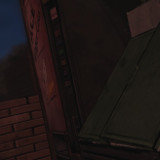 This is the basic story, which the writers, directors and whatnot decided to
structure into some kind of sitcom3 made up of „chapters”, „episodes” and
„seasons”. So far Seasons One and Two are available, but I've decided to cover
only the first one, although I might make this into a series if things get
interesting along the way.
This is the basic story, which the writers, directors and whatnot decided to
structure into some kind of sitcom3 made up of „chapters”, „episodes” and
„seasons”. So far Seasons One and Two are available, but I've decided to cover
only the first one, although I might make this into a series if things get
interesting along the way.
Anyway, this whole structure leads me to see the crux of the game as "stuff happens": various characters come and then go, mostly by getting eaten or shot or what happens in the somehow believable universe of The Walking Dead. This, of course, makes nitpickers such as myself want to dig deeper for a meaning, or understanding where all the unholy flesh-eating disorder comes from. Unfortunately not even a clue is given by the end of the first season, which is quite believable given this rather peculiar universe, where actual food is a rare commodity, let alone stuff such as electricity. What I particularly liked about it is that this didn't make it horror or anything, only downright disturbing.
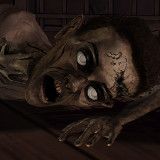 The story of the first season is, however, or at least I believe it is one of
maintaining an ounce of sanity in the midst of chaos. At the end of the day
it's Lee trying to educate a girl he becomes attached to pretty early on, while
surviving along with a bunch of other people and making the tough decisions,
but the normal decisions regarding the circumstances.
The story of the first season is, however, or at least I believe it is one of
maintaining an ounce of sanity in the midst of chaos. At the end of the day
it's Lee trying to educate a girl he becomes attached to pretty early on, while
surviving along with a bunch of other people and making the tough decisions,
but the normal decisions regarding the circumstances.
The game implements a decision tree spanning I think from the first episode of the season to the last (and, from what the developers say, into the following seasons), where the player is faced with choosing between some evil or another, between saying something stupid or something stupider and so on. The weird part is that a large part of the dialogue choices are timed, which gives you the option to shut up, which I find to be a breath of fresh air, despite the possible frustration it might cause. These mechanics extend to other actions, such as deciding between what object you'll toss down the head of a "walker" next or trying desperately to avoid a fight with someone whose help you might need later. My feelings regarding this whole thing range from "wow, cool, take that bullet, put it into the shotgun, just like in real life! then shoot the goddamned zombie" to "fuck, I can't find the focus point for this object, welp, now I'm dead, gotta restart". In some ways that's just like in real life, but in others, spending too much time trying to select an object that's right in front of you can be frustrating.
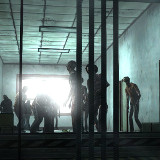 Overall, the game's mechanics tend to orient it towards an "interactive drama",
less focused on combining this object with that and fitting it with the rubber
ducky, and more on dialogue, even though The Walking Dead is no Gabriel
Knight4. Myself, I would have preferred the feeling of a good book
instead of that of a good TV show, but I get it, Telltale are really good at
making this kind of stuff.
Overall, the game's mechanics tend to orient it towards an "interactive drama",
less focused on combining this object with that and fitting it with the rubber
ducky, and more on dialogue, even though The Walking Dead is no Gabriel
Knight4. Myself, I would have preferred the feeling of a good book
instead of that of a good TV show, but I get it, Telltale are really good at
making this kind of stuff.
As hinted before, I've only played Season One so far. I don't know where this is going: the authors seem to want to stick it to a five-parter, which means that the story is supposed to have a well thought out beginning and an end right at this moment. The feeling I've been given so far, and I hope I'm wrong, is that this has the potential of going in the direction of Lost or some other TV series I haven't seen5, ending stuck in a rut, or maybe worse. Well, I never thought I'd say this, but the whole zombie apocalypse thing has great potential to be exploited in exactly the right way. And I'm looking forward to playing, and hopefully enjoying, the whole thing.
Post Scriptum: I get that the American public is sensitized to the emotionally wrecking thing, but it hasn't quite gotten to me. The final scene almost got a tear out of me, but I still made the right decision, which was to tell Clementine to blow Lee's brains out. Hey, sorry, that's one fucked up world, it'd be stupid to judge it by any "normal" standards.
-
I promise I'll write about the beginning of the 2000s, when some of the best (and last) adventure games ever spurted out of the middle of Nor... I mean, nowhere. I am looking forward to it, oh, with so many deep feelings and so much nostalgia. ↩
-
That's because I like to think that I prefer writing analyses and not reviews. I've tried to shed my thoughts on some good games without a good story, but I eventually found out it wasn't worth it. So, there you go. ↩
-
Actually, a walkdram? ↩
-
Gabriel Knight is more of an "interactive narrative" if you ask me. ↩
-
Actually, there are a few I've seen: Star Trek and spin-offs? Stargate SG-1 and spin-offs? The Simpsons? Maybe Twin Peaks, but this one was really great and ruined by whoever decided to mess up Lynch's brilliant idea. Oh, which reminds me: Seinfeld, but that was a show about nothing in the first place. ↩
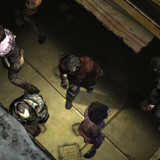
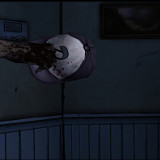
Given recent lulz with viruses taking over the world, now's perhaps a fairly good time to revisit this article, and the TWD universe in its entirety.
I also took a brief look at the TV show, and reviewing this, two main points stuck with me. For one, I was spot-on with "this has the potential of going in the direction of Lost or some other TV series I haven't seen": both the show and the game throw some philosophical manure down the viewer/gamer's general direction -- mostly along the lines of "is there anything of the original person left in the walker?". This is great and all, except these philosophical and scientific questions remain largely unexplored, and maybe rightly so, given that the characters live in a post-apocalyptic world with scarcely any means to look at anything except their own survival. Still, the show ends up focusing on its characters' evolution, some petty political problems and... well, that's about where it ends. Nothing wrong with this, except it makes the subject matter wholly uninteresting.
As for the second point: even though the characters aren't able (both intellectually and through other means) to "do science", the viewer does, given his detached view on events occuring in that universe. This naturally leads me to the question of that virus, its origins and its workings. My remark that "the whole zombie apocalypse thing has great potential to be exploited in exactly the right way" was naive at best; no, I don't believe there's any actual potential there, since we seem to be dealing with a sort of magic virus that makes its hosts capable of existing in a semi-vegetative state for a long while without any sort of metabolism. Tell me, how the fuck is this even possible? are they photosynthesizing, or what? I'm pulling this out of my ass, but I expect such an "organism" to exist for at most a couple of months (again, number pulled out of my ass, perhaps it's less than that!) before completely decaying. This means that TWD should be walker-free after the first season or so; and meanwhile, either everyone learns of the airborne thing and comes up with sane practices of getting rid of the dead, or everyone simply goes away, leaving the planet free of humans. I don't see any middle ground here, no full decade (or however many years the comic spans so far) of people struggling to survive among zombies that appear... well, out of fucking where?
As far as I'm concerned, I played the first two seasons or so a few years ago (I don't even remember exactly, to be honest) then I left the game's rotting corpse to walk wherever it wishes. Meanwhile the old Telltale died too; I also tried The Wolf Among Us, among other of their games (most notably, games related to Monkey Island) and now with their relaunch, I find it hard to believe they have anything interesting left to bring to the table. I'll be here though, so please change my mind.
When I first played this game, I was already at the age when the old cinematic bullshitting techniques didn't fly anymore; I'd seen enough of the storytellin' genre to tell apart the good writing from the bad, to spot them poor game designs and whatnot... anyway, I'd sincerely expected this to not stick, what the hell, am I going to start following post-apocalyptic zombie soap operas now?
Much to my surprise, I keep orbiting around this The Walking Dead universe, and it's just occurred to me why: this apocalyptic virus thing is the perfect metaphor for the masses' dehumanization. In the logic of TWD, the dude lying in front of "his" TV all day long and the walking abomination are no different in essence, in that they're both as good as dead. It took almost half a century of ubiquitous "mass media" to achieve what a hypothetical virus did in less than a year, which I guess puts covid in the category of underperformers. Other than that, the same sad imagery of decay can be observed in both universes, which I s'ppose makes TWD's feudalistic view of the future a prophecy of sorts. We'll see.
[...] a decade and a couple of months ago, I reviewed the adventure game with the same name, set in the same universe as the TV show. The TV show debuted a couple of years [...]